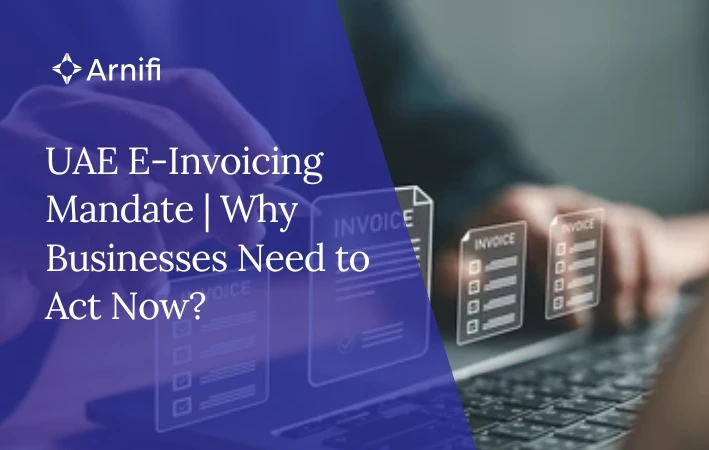UAE E-Invoicing Mandate | Why Businesses Need to Act Now?
by Shethana Jul 09, 2025  6 MIN READ
6 MIN READ

By July 2026, the UAE will mandate e-invoicing across all VAT-registered businesses. That might sound far off, but if your invoicing still involves PDFs or printed receipts, it’s time to rethink how you operate. This isn’t just a tech upgrade, it’s a structural shift in how financial data is created, shared, and stored across the UAE economy.
Table of contents
What Is E-Invoicing?
E-invoicing isn’t about emailing a PDF. It’s the digital creation and transmission of invoices in a structured format like XML or JSON. These files allow real-time submission to the Federal Tax Authority (FTA), making manual data entry obsolete.
Here’s how it works:
- You create an invoice from your billing or ERP system.
- The system sends this invoice directly to the FTA through an accredited platform.
- The FTA validates and archives the invoice almost instantly.
This allows the tax authority to access real-time data, while businesses benefit from cleaner records and better compliance tracking.
Why the UAE Is Doing This?
The UAE is aligning with global best practices. Countries like Saudi Arabia, India, and many across Europe have already adopted or are in the process of adopting mandatory e-invoicing.
For the UAE, the goals are clear:
- Tighter tax compliance – real-time invoice reporting means fewer loopholes
- Faster VAT reconciliations – businesses can claim refunds with minimal delays
- Digital transformation – streamlining how financial records are created and shared
- Improved transparency – having a standard format reduces fraud and audit friction
This is also about future-proofing. E-invoicing lays the groundwork for automated tax assessments, AI-driven analytics, and a more connected digital economy.
The Rollout Timeline
Although the official rollout is set for July 2026, the timeline is more layered than it looks.
Here’s what we know:
- 2024-2025: Businesses are being advised to assess their readiness and upgrade systems.
- Mid-2025: The FTA will release the list of Accredited Service Providers (ASPs), these are the platforms through which businesses must route their e-invoices.
- July 2026: The first phase of mandatory e-invoicing begins. It will likely target larger businesses and high-volume invoice issuers.
- Post-202: SMEs and other categories will be phased in gradually, following the model used in other jurisdictions.
While some businesses may not be part of Phase 1, it’s clear everyone will eventually have to comply. Starting now gives you the time to transition smoothly, without chaos, missed deadlines, or system breakdowns.
What Businesses Should Do Right Now?
If your invoicing is still manual, semi-digital, or handled through outdated systems, now is the time to act. Here’s a clear checklist to follow:
1. Audit Your Current Invoicing System
Can your ERP or billing software generate machine-readable files like XML or JSON? If not, you’ll need to explore upgrades or integrations. Don’t assume your current software is compatible; check with your provider.
2. Form an Internal Task Force
This isn’t just an IT project. You’ll need coordination between:
- Finance teams (for compliance and VAT handling)
- IT (for software changes)
- Operations (for process alignment)
- Legal and tax consultants (for risk mitigation)
3. Stay Updated on the FTA’s ASP List
Once the FTA announces its list of approved service providers in 2025, pick one that integrates well with your current systems. These platforms will act as intermediaries, routing your invoices directly to the tax authority.
4. Start Testing Early
Even if your company won’t be in Phase 1, running pilot batches now will help uncover issues before they become urgent. The earlier you test, the better your data hygiene and system readiness.
5. Train Your Staff
Finance and admin teams will need to understand the new workflows. This includes error handling, resubmission of rejected invoices, and archiving practices. Hands-on training will save time (and panic) down the line.
Challenges You’ll Likely Face
Transitioning to e-invoicing comes with its share of roadblocks. Here’s what to expect, and how to get ahead of them:
- Legacy Systems: If you’re using outdated software, expect delays and potential reimplementation costs. Budget for system upgrades or migration.
- Data Quality: E-invoicing requires standardized input. If your records are inconsistent, wrong tax numbers, duplicate invoices, etc, you’ll need to clean that up.
- Integration Complexity: Connecting your software to an ASP and syncing real-time reporting with FTA’s systems takes planning. Don’t underestimate integration timelines.
- Workflow Overhaul: Internal teams will need to adapt. Processes for invoice creation, approval, and submission will all shift. Change management is key.
Why Early Adoption Is a Smart Move?
Let’s be blunt! last-minute compliance never ends well. We saw this with the corporate tax rollout, where businesses faced fines, technical issues, and compliance gaps simply because they started late.
Getting ahead of the e-invoicing mandate means:
- Less stress during implementation
- Time to train your staff properly
- Smoother internal transitions
- Better positioning with vendors, customers, and regulators
- Faster access to VAT refunds due to cleaner, real-time filings
It also sends a strong message to your partners and clients: you’re compliant, modern, and serious about business integrity.
Final Thoughts
The UAE isn’t asking businesses if they want to e-invoice-it, telling them when. That deadline is July 2026, but the real work starts now. If you’re a VAT-registered business, large or small, ignoring this shift puts you at risk of fines, operational disruption, and reputational damage.
But if you act early, this becomes more than a compliance box to tick. It’s a chance to clean up your financial operations, improve audit readiness, and unlock smarter cash flow management.
So don’t wait for the FTA to knock. Start planning your transition to e-invoicing today, and turn a regulatory change into a business advantage.
How Arnifi Can Help?
If you need expert assistance, Arnifi is here to help. As a UAE-headquartered corporate solutions provider, Arnifi supports businesses through seamless transitions in UAE Corporate Tax, UAE e-invoicing, and overall compliance frameworks. Partner with us to stay ahead in a digital-first economy.
UAE e-invoicing, and regulatory compliance, Arnifi helps businesses stay ahead in a fast-evolving market.
Top UAE Packages

Related Articles
Top UAE Packages



